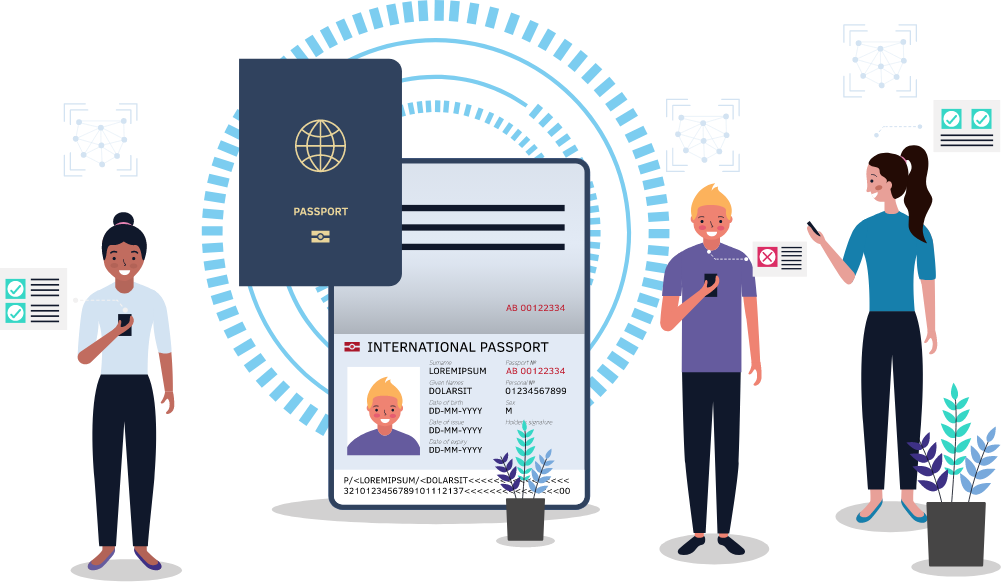Fraudulent Identity Documents and Modern Slavery

Modern slavery is a subject we are hearing more and more about in the UK. It can take many forms but often involves trafficking people across and within countries. In this blog, we explore the growing problem, the links with fraudulent documents, and how Identity Document Validation Technology (IDVT) could help.
What is Modern Slavery?
Modern slavery takes many forms but refers to situations where a person’s freedom has been taken away – such as their freedom to refuse certain work or to stop working. This is done by way of threats, violence, coercion, abuse of power and deception. Anyone could be pressed into forced labour, but people in vulnerable situations – such as being in debt, or not having access to their passport – are most at risk.
To put the issue into perspective, over 12,000 individuals were referred to UK authorities in 2021, and this figure continues to grow year on year. The real number of people trapped in slavery is estimated to be much higher, at around 130,000 people. Last year, criminal exploitation was the most common form of slavery in the UK, followed by forced labour.
Modern Slavery Act 2015
The good news is that the Modern Slavery Act 2015 means that the UK is leading the way in terms of legislated disclosure requirements. Section 54 of the Act requires every business with an annual turnover of £36m or more which carries on a business or part of a business in the UK, to produce an annual statement of the steps it takes to ensure that slavery and human trafficking are not taking place.
This has been the proverbial ‘stick’ to encourage businesses to be more transparent in how they operate their labour force, and how they are taking practical steps to prevent forced labour in their supply chains.
Fraudulent identity documents
Traffickers are consistent with the methods they use to recruit victims and prevent them from escaping, irrespective of the type and nature of exploitation.
One main method used by traffickers is to withhold their victim’s identity documents once they have arrived in the UK. These are often replaced with fraudulent identity documents to gain employment in legitimate work, as well as masking their true nationality and gaining access to benefits. This also serves to isolate victims, restricting their movements and preventing their escape. Workers with precarious immigration status are often used by traffickers who want to conceal illegal activity, as these workers are judged less likely to go to the police for fear of being deported.
The victims are then forced to work around the clock for next to no wage, with any payments going directly to their traffickers. Tony Dunkerley, a former Police Detective and Force Practitioner on Modern Slavery says “What we were seeing on the ground matched what was happening globally; the International Labour Organisation’s (ILO) Special Action Program to Combat Forced Labour (SAP-FL) had also identified document retention as one of several common indicators of modern slavery.”
How can technology help?
The Home Office explains how Identification Document Validation Technology (IDVT) can play an important role in preventing the use of fraudulent identity documents. Identity Service Providers (IDSPs) such as TrustID, can help to quickly and easily assess whether a document is genuine and that the individual you are employing is the same as the person presenting the identity document.
Signs / Indicators of Modern Slavery
Some additional signs that an applicant might be in slavery include:
A worker who looks malnourished and unkempt. Do they wear the same clothes every day or have unsuitable clothing, e.g. missing PPE or inadequate footwear?
Someone who frequently appears frightened or withdrawn. Is the worker suffering physical injuries? Are they vague, reluctant, or inconsistent in explaining how the injury occurred?
An employee who seems reluctant to talk or provide information. Does someone speak on their behalf? If they do speak, are they inconsistent with facts, such as where they live?
A worker who doesn’t come to work independently. Are they dropped off or picked up at unusual times of the day and in the same, unusual way?

Modern Slavery in construction
Tony Dunkerley speaks of his experience of modern slavery and fraudulent documents within the construction industry. This industry may be particularly vulnerable to modern slavery and forced labour due to its inherent and complex use of sub-contracted labour, often sourcing so-called ‘low-skilled’ migrant labour through agencies without effective due diligence processes. In addition, many construction businesses rely on visual-only checks on sites for identity documents. Making visual ID checks presents a significant challenge for onsite staff who, without any technology to support them, do not have sufficient training to make an informed decision on ensuring documents are genuine.
Our 2021 trends blog also highlights that our customers placing applicants into construction saw the highest number of fake identity documents.
Beyond the ethical implications of employing illegal workers, employers can receive a fine of up to £60,000 for each illegal worker they employ, or in certain circumstances be sentenced for up to 5 years with an unlimited fine if an employer knew or had ‘reasonable cause to believe’ a worker didn’t have the Right to Work in the UK.
Workers without valid accreditation and training also present a significant risk in the construction industry, not only in terms of being potential victims of forced labour, but also in relation to the safety of themselves and others on sites. It is therefore important for construction companies to be vigilant in their approach to due diligence assessments on the identification of their entire workforce.
Want to find out more?
Our document validation services could help you with compliance by making quick, consistent checks. Why not get in touch to find out how we could help you?
Sign up to receive updates
Receive notifications from TrustID direct to your inbox. Simply fill out your email address in the form below.
Want to find out more?
We’d be really happy to chat through your requirements and offer advice on the best service for your business.
Tel: 0118 466 0822 or email us.
Request a callback


